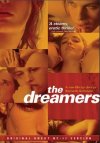BUY THE DVD:
|


|
|
|
SYNOPSIS:
| |
a young american studying in paris in 1968 strikes up a friendship with a french brother and sister.
|
|
|
MOVIE FACT:
| |
was first film since bent (1997) that was released theatrically in the united states with a nc-17 rating.
|
|
|
RATING:
|
 
two out of four possible stars
|
|
|
|
A film that shares many of the hallmarks of a Bernardo Bertolucci creation, The Dreamers is often more beautiful on its surface than it is interesting in its content. Elements such as interesting discourse at the family dinner table, a healthy use of popular culture songs, and delicate cinematography are all signs of a Bertolucci film, but the narrative seems more flat than his usual creations. Sometimes there is a strong statement made on the radical mentality of 1960's Parisians, but as a result of questionable casting and dialogue, the film overall fails to find purchase in the heart or conscience of the viewer.
While some may consider the sexual tension and explicit sex scenes as mere devices to shock the audience, viewers should note that Bertolucci is generally a very sensual filmmaker and sex is not the "point" of his films. There is always a strong element of social consciousness present in his movies, and sometimes these efforts are dramatically successful, though in The Dreamers, they are more often than not far less impressive than they should be. Despite the strong intensity of the young lead actors, the film's social statement seems more of an intrusion into the sexual escapades of a nearly incestuous brother and sister and their American visitor.
In point of fact, the end of the film is particularly jarring as the radical politics of the era are thrust almost unnaturally into the story after having been mostly an afterthought during the entire second act (the middle) of the film. Although the violence and uprising of late 1960's France is brought into vivid detail by scenes of protest in beautiful Paris locations, the emphasis on the political ideas of the era is completely overshadowed by the characters' relationships during the middle of the film.
And those character developments and devices seem rudely interrupted by the politics in the final scenes of the film. Rather than present a cinematographic statement on the history of the era or, conversely, depict a sultry story of sexual taboos of teenage intimacy, the film tries to straddle both concepts, never coming to terms with its own duel identity. From the panic-ridden streets of the dangerous fanaticism that gripped the French people of the era to the shocking and blatant portrayal of human sexuality, it's difficult to determine what type of viewers would be most entertained by this film. Or determine which viewers would find it most believable or affecting.
Ironically, if one were to take each of its elements individually (most of them, anyway) it's easy to see the many successes of this film's crew. The cinematography in particular, is both subtle and cunning, depicting the almost claustrophobic interiors of a Paris apartment as beautifully as the exteriors of the on-location Paris buildings. Director of photography Fabio Cianchetti, in his fourth collaboration with Bertolucci as cinematographer, shows the director's trademark habit of placing the actors in a scene and letting the performances carry the visual interest, rather than the movement of the camera.
Unusual profile shots, extended instances where a character remains stock-still for more than a comfortable moment, shots where a character will enter and leave a shot without the camera following his or her movement, all of these visual techniques mark the film as a Bertolucci creation. Jean Rabasse's production design and Eric Viellerobe's set decoration make a positive impression as well, giving the film an elegance yet not detracting from the emotional input of the actors and their characters.
Though in commenting on the performances, sometimes it seems as though the look and feel of the movie is rather more important that the characters and the impact they make on the society of the time. Perhaps it is the specific casting choices in combination with the dialogue of the film, which seems slave only to the vivid sexual exploits of the characters. In the lead role, Michael Pitt, playing, "Matthew," an American foreign exchange student studying in Paris, he doesn't seem to go through much of a change, emotionally speaking. Part of what draws an audience to a film's conclusion is the difficulties that a character either overcomes or is overcome by.
As "Matthew," Michael Pitt seems to do neither. Which, granting the fact that he has some prior experience in feature films, seems more a failing of the character itself rather than anything Pitt might have brought to the role. A sometimes whiney and usually unsure young man, Matthew will find difficulty in pulling the audience into his emotional struggle, particularly since he doesn't really have one. Likewise, Eva Green and Louis Garrel, playing "Isabelle" and "Theo," the complicated French siblings, won't show the audience any movement forward considering their lack of emotional development over the course of the film.
It's as a complete picture that the professional filmmaking techniques don't hold up, due to the weighty pressure of the era in which the film takes place and the emphasis on the sexual escapades of the movie's young stars. If a film's success could hang solely on one specific element (such as soundtrack choices or cinematography), this film might have stood up under harsher scrutiny, but in its current state, the film is but a weaker effort on the part of a talented director.
Review by Kelsey Wyatt.
| |
|